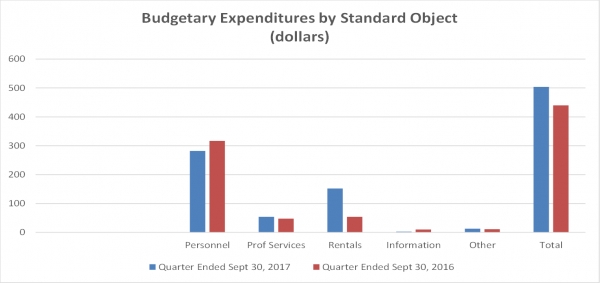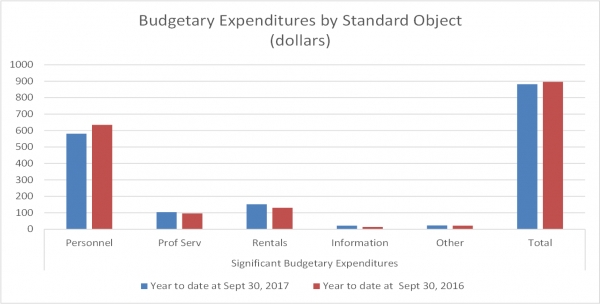Quarterly Financial Report ending September 30, 2017
Statement Outlining Results, Risks and Significant Changes in Operations, Personnel and Program
1. Introduction
1.1 Background to the Quarterly Financial Report
As per GC 4400, Departmental Quarterly Report, the Office of the Communications Security Establishment Commissioner (Office) is submitting its quarterly report for the period ending September 30, 2017.
This section of the quarterly financial report should be read in conjunction with the Main Estimates (and as applicable - Supplementary Estimates and previous interim reports for the current year). The report has been prepared by management as required by section 65.1 of the Financial Administration Act and in the form and manner prescribed by the Treasury Board. This quarterly financial report has not been subject to external audit or review.
1.2 Authority, Mandate and Program
The position of Communications Security Establishment Commissioner was created to review the activities of Communications Security Establishment (CSE) to determine whether it performs its duties and functions in accordance with the laws of Canada. This includes having due regard for the privacy of Canadians.
The Commissioner derives his authority and mandate from the National Defence Act:
- reviewing CSE activities to ensure they comply with the law;
- conducting any investigations deemed necessary in response to complaints about the CSE;
- reviewing and reporting annually to the Minister on review activities carried out under an (ministerial) authorization
- informing the Minister of National Defence and the Attorney General of Canada of any CSE activities that may not be in compliance with the law; and
- submitting to the Minister for tabling in Parliament, within 90 days after the end of each fiscal year, an annual report on the Commissioner's activities and findings.
In addition the Commissioner also has a mandate under the Security of Information Act to receive information from persons who are permanently bound to secrecy seeking to release special operational information on the grounds that it is in the public interest.
Further information on the mandate, roles, responsibilities and programs of the Office can be found in the Office's 2017–2018 Departmental Plan and in the Main Estimates.
1.3 Basis of Presentation
This quarterly report has been prepared by management using an expenditure basis of accounting. The accompanying Statement of Authorities includes the Office's spending authorities granted by Parliament and those used by the Office consistent with the Main Estimates and Supplementary Estimates (as applicable) for the 2017–18 fiscal year. This quarterly report has been prepared using a special purpose financial reporting framework, designed to meet financial information needs with respect to the use of spending authorities.
The authority of Parliament is required before moneys can be spent by the Government. Approvals are given in the form of annually approved limits through appropriation acts or through legislation in the form of statutory spending authority for specific purposes.
When Parliament is dissolved for the purposes of a general election, section 30 of the Financial Administration Act authorizes the Governor General, under certain conditions, to issue a special warrant authorizing the Government to withdraw funds from the Consolidated Revenue Fund. A special warrant is deemed to be an appropriation for the fiscal year in which it is issued.
The Office uses the full accrual method of accounting to prepare and present its annual departmental financial statements that are part of the departmental results reporting process. However, the spending authorities voted by Parliament remain on an expenditure basis.
2. Highlights of fiscal quarter and fiscal year to date (YTD) results
Second Quarter
It should be noted that the Authorities in the Statement of Authorities and the Planned Expenditures in Table 1: Departmental budgetary expenditures by Standard Object have been adjusted to account for the receipt of the operating budget carry-forward ($97 thousand) carried over from fiscal year 2016-17.
As reflected in the attached Statement of Authorities and in Table 1 Departmental budgetary expenditures by Standard Object (below) and illustrated in the chart (below), the Office's second quarter spending in 2017–18 is up $64 thousand from the same quarter of the previous year.
This change can be attributed to the following factors:
- the increase of $98 thousand for rent was due to delays in Public Services and Procurement Canada billings as all six months were billed in the second quarter of 2017-18;
- the increase of $6 thousand for professional services was due primarily late billings by Public Services and Procurement Canada in 2016-17 for human resource services;
- a slight increase in other costs of $2 thousand;
- the decrease in personnel costs of $35 thousand was due primarily to employee departures and a reduction in related employee benefits offset in part by the costs and timing of performance pay, 2nd quarter this year and 3rd quarter last year; and
- the decrease in information costs of $7 thousand was due primarily to a timing difference in the payment of the costs related to the annual report. The costs were paid almost entirely in the first quarter this year and almost entirely in the second quarter last year.

Fiscal Year-to-date
As reflected in the attached Statement of Authorities and in Table 1 Departmental budgetary expenditures by Standard Object (below) and illustrated in the chart (below), the Office's year to date spending in 2017–18 is down $14 thousand from the year to date expenditures in 2016-17.
This change can be attributed to the following factors:
- the decrease in personnel costs of $53 thousand was primarily due to employee departures and the reduction in related employee benefits offset by the timing of performance pay (2nd quarter this year; 3rd quarter last year);
- the increase in rental costs of $22 thousand was due to the late billing of 1 month's rent in 2016-17 by Public Services and Procurement Canada;
- the increase in information costs of $8 thousand was due primarily to the initiation of a research paper in 2017-18;
- the increase in professional services of $8 thousand was due primarily to an increase in the volume of information requiring translation; and
- an overall increase of $1 thousand in all other costs (transportation increase of $2 thousand; a decrease in the cost of supplies of $1 thousand; and no change to the costs of repairs).

3. Risks and Uncertainties
Bill C-59
On June 20, 2017, Bill C-59, An Act respecting national security matters, was given first reading in the House of Commons. Under the proposed legislation, when the legislation comes into force, the Commissioner of the Communications Security Establishment becomes the Intelligence Commissioner, the Office of the Communications Security Establishment Commissioner becomes the Office of the Intelligence Commissioner, the employees of the Office of the Communications Security Establishment Commissioner become employees of the Office of the Intelligence Commissioner and the money remaining from the appropriation to the Office of the Communications Security Establishment Commissioner is deemed to be an amount appropriated to the Office of the Intelligence Commissioner.
With no certainty as to when the legislation will come into force, the Office continues to conduct reviews and support the Commissioner in the discharge of his mandate.
4. Significant changes in relation to operations, personnel and programs
The Office is in the process of restructuring the organization to be able to continue to deliver on the Commissioner's review mandate while at the same time managing the risks related to, and preparing for, the potential changes that may result under Bill C-59.
5. Approval by Senior Officials
Originals signed by:
The Honorable Jean-Pierre Plouffe, CD
Commissioner
J. William Galbraith
Chief Financial Officer
Ottawa, Canada
November 30, 2017
Statement of Authorities (unaudited)
| Total available for use for the year ending March 31, 2018 | Used during the quarter ended Sept 30, 2017 | Year to date used at quarter-end | |
|---|---|---|---|
| Vote 1 - Program Expenses | 2,037 | 462 | 798 |
| Statutory authorities – Contributions to employee benefit plans | 169 | 42 | 84 |
| Total Budgetary authorities | 2,206 | 504 | 882 |
| Total authorities | 2,206 | 504 | 882 |
| Total available for use for the year ended March 31, 2017 | Used during the quarter ended Sept 30, 2016 | Year to date used at quarter-end | |
|---|---|---|---|
| Vote 1 - Program Expenses | 2,026 | 393 | 803 |
| Statutory authorities – Contributions to employee benefit plans | 185 | 47 | 93 |
| Total Budgetary authorities | 2,211 | 440 | 896 |
| Total authorities | 2,211 | 440 | 896 |
Departmental budgetary expenditures by Standard Object (unaudited)
| Expenditures: | Planned expenditures for the year ending March 31, 2018 | Expended during the quarter ended Sept 30, 2017 | Year to date used at quarter-end |
|---|---|---|---|
| Personnel | 1,246 | 282 | 581 |
| Transportation and communications | 31 | 4 | 12 |
| Information | 65 | 3 | 22 |
| Professional and special services | 489 | 54 | 104 |
| Rentals | 318 | 152 | 152 |
| Repair and maintenance | 3 | 1 | 1 |
| Utilities, materials and supplies | 29 | 8 | 10 |
| Acquisition of land, buildings and works | 0 | 0 | 0 |
| Acquisition of machinery and equipment | 25 | 0 | 0 |
| Other subsidies and payments | 0 | 0 | 0 |
| Total gross budgetary expenditures | 2,206 | 504 | 882 |
| Total net budgetary expenditures | 2,206 | 504 | 882 |
| Expenditures: | Planned expenditures for the year ending March 31, 2017 | Expended during the quarter ended Sept 30, 2016 | Year to date used at quarter-end |
|---|---|---|---|
| Personnel | 1,323 | 317 | 634 |
| Transportation and communications | 32 | 4 | 10 |
| Information | 24 | 10 | 14 |
| Professional and special services | 446 | 48 | 96 |
| Rentals | 317 | 54 | 130 |
| Repair and maintenance | 4 | 1 | 1 |
| Utilities, materials and supplies | 27 | 6 | 11 |
| Acquisition of land, buildings and works | 0 | 0 | 0 |
| Acquisition of machinery and equipment | 38 | 0 | 0 |
| Other subsidies and payments | 0 | 0 | 0 |
| Total gross budgetary expenditures | 2,211 | 440 | 896 |
| Total net budgetary expenditures | 2,211 | 440 | 896 |
- Date modified: